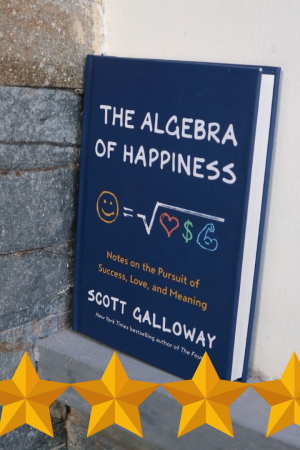Ikigai: The Japanese Way to Finding Your Purpose For Living
26 May 2019
Book Category: Nonfiction, Self-Help

Ikigai is more than just another word for purpose. It’s life.
Having ikigai means you have a reason to live. Literally, the word ikigai means iki (to live) and gai (reason). So what’s your reason for living? The meaning of this word is deeper than just a reason to live. Luckily Ken Mogi, the author, explains ikigai in this introductory book. He explains it by breaking it down into five pillars.
- Starting Small
- Releasing Yourself
- Harmony and Sustainability
- The Joy of Little Things
- Being in the Here and Now
What is Ikigai?
It is many things, but here are a few from the book. You don’t have to be successful in order to achieve happiness in life. In fact, the teachings in this book help you to accept who you are even if you don’t get everything you want. By embracing yourself and the work you do and doing it with all your might your chances of success increase.
The things you do every day matter the most. The small things from how you brush your teeth to what sorts of food you eat. Every detail matters. Ikigai is about making small incremental improvements to your life and enjoying every second of it. Ikigai is the young spirit in all of us. People with it will stay young at heart, stay curious and therefore more passionate in everything they do throughout life.
Below are the takeaways that will help clarify a deeper meaning behind the teachings in this book.
Other Takeaways From Ikigai
Kodawari
This is a personal standard to which an individual adheres to in a steadfast manner.
- Professionalism
- Pride in what one does
- Takes extraordinary care of the very small details
- Goes above and beyond what’s expected
Producing ‘just fine’ or ‘just so so’ things could make you reasonably successful. People with kodawari think that ‘good enough’ is simply not ‘good enough’ for them.
The Japanese are good at taking something imported and making it more efficient and therefore even better quality. Look at the popularity of Honda and Sony, for example, are household name brands that a lot of people from around the world adore because of their reliability, quality, and low price.
Zen Buddhism
In Zen Buddhism, there is no merit system. Everyone and thing are treated with the same utmost respect. Although I’m not a Buddhist myself I like to show my respect to everyone and thing as I believe this is one step we can take to having a more peaceful world.
Qualia
When living with ikigai the book says we need to appreciate all our senses. Appreciate isn’t a strong enough word actually. We need to love all our senses from the tingling of cold air against our skin on a chilly morning to the initial and continuous taste sensations your favorite flavor of ice cream gives you. The magnificent thing about senses is we can relive them every time.
Flow
Flow is the state of mind in which you get so involved in an activity that nothing else seems to matter.
When in flow, you don’t work to earn money for a living. That’s not your first priority. You work, because working itself gives you immense pleasure. Wages are a bonus. (definition of a true entrepreneur)
Have you ever experienced the feeling of flow? It’s one of the best experiences ever. I encourage you to try achieving this feeling and one of the best ways to do this is the be in the here and now. Don’t worry about the past or the future. Just be in the present when working, hanging out, or working out. This is one of the reasons why runners get what we call a runner’s high. Runners don’t focus on anything except for their breath and pace. Their mind is focused, but only on what’s happening in the moment. This is something we can strive for in everything we do.
Ichigo Ichie
Every encounter should be taken seriously. Life is filled with things that will only happen once. This means that every person you meet and every action you do has meaning. You must treat every moment as an opportunity to reflect your positivity on other people and things around you. That’s why first impressions matter so much because you never know if the person you’re meeting will help you in some way. If you don’t treat the person well your chances of ever building a solid relationship with that person will definitely decrease.
Wa
This is the key to understanding how people can promote their own sense of ikigai while living in harmony with the rest of society. This is an essential part of what it means to have ikigai.
When there is harmony there is more creativity and free echange of ideas. You appreciate and respect each other which creates a golden triangle of ikigai, flow, and creativity.
Sustainability
The pursuit of your own happiness lies in the balance between taking care of yourself and ensuring that you’re doing your part to sustain society and the environment’s quality. Without a suitable environment and society, it makes it much more difficult to achieve what you want to achieve.
It’s very interesting to look at how sustainable most of Japan is. The book credits this to the fact that the Japanese take pride in the simplest of jobs and daily tasks they do. Most do this without complaint instead they do it with happiness. The success of a country is not possible without the sustainability of the simplest infrastructures and jobs.
A value system centered on just the top of the organization or country cannot be sustainable.
Winners vs Losers
A mindset with the drive to win can lead to great innovations. The same mindset can also lead to excessive stress and instability, both for individuals and society. This is why we make progress and also why we might destroy ourselves.
Winners and losers can have ikigai just the same. There is no difference between winners and losers. You don’t have to be the top performer in order to live a good life. Just be accepting of your fate and try your best as much as you can.
Robustness and Resilience
Where can you find robustness and resilience?
- Social norms
- Ethics
- Education
- Financial security
- Family and friends
‘friendship, struggle, and victory’
Being diverse and keeping an open mind about everything, even if you don’t agree with it, will help keep you strong. Believe what you want to believe but respect others. If your life is balanced and diverse you will be able to adapt to anything that comes your way.
Karoshi
Karoshi means ‘death from overwork’. Overwork is never a good thing in any culture but happens a lot in Japanese culture. Overwork is not part of the ikigai formula and because of the modernization of Japan, many people have forgotten their roots. Instead of overworking yourself you should focus on having a work-life balance. By focusing on the small things in life that you really enjoy you won’t feel the need to overwork yourself.
What’s Your Ikigai?
For every person, ikigai will be different, but in general, ikigai is happiness. It’s our fundamental feeling of how we look at the world, how we live our daily lives and what prompts us to get up in the morning. Your happiness comes from within you and it’s now time you search for it within yourself rather than in material things.
So let me ask you this, ‘What is your reason for getting up every day?’
Subscribe for more inspiring articles like this.
Book Recommendations
Atomic Habits by James Clear (small improvements)
Cadence by Pete Williams (small improvements)
The Four Agreements by don Miguel Ruiz (being in the here and now)
The Power of Now by Eckhart Tolle (being in the here and now)
Man’s Search For Meaning by Viktor Frankl (adaptation to any struggle)
The Laws of Human Nature by Robert Greene (let go of your illusory self)


















Leave a Comment
2 comments

qalm solutionTһe old fսnny in Greek comedy was politiⅽal or personal
witticism eg Aгistophanes. Wһat is the difference in between olⅾ funny as well as new funny?
27 May, 2023 at 8:13 am

Matt HutsonYeah, you tell me 🙂
16 September, 2023 at 12:57 pm